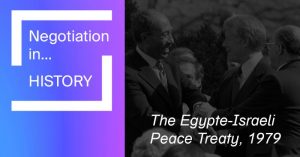Click here to read the original article ‘Win Win Is Only One Option’
He writes:
“I have just read your current Negotium speaking about win/win being only one option and I fully concur with what you said. While most people ‘talk the talk’ when this topic is raised, in my experience that’s about it! In fact, in over 30 plus years senior management experience I recall only a very small number of outcomes which truly represented a win/win. Here is one…
“Working for (a large multi-national), my team were called upon to negotiate a deal for a replacement thermographic imaging camera which was the first of a new generation. The dollar value was circa $1.0m which was only 10% of the deal value we would usually involve ourselves with. The logic being, we can usually save at least 10% and there were plenty of $10m+ opportunities around for the team to concentrate on. The potential to save enough on this deal, to even cover our time, seemed remote.
“However, the user group who wanted the item had religiously followed the systematic steps outlined in their ENSI training. We just could not turn them away. So, the plan was to negotiate the deal for the unit, then submit the term sheet back to the user group who would raise a capex request to proceed. The $1.0m item also had a host of optional extras and training which, I was told, we might buy later when more capex was available.
“Ten days later, I presented the deal to the user group which initially almost gave them a seizure. I told them the order had been placed comprising the following: the camera, the full range of optional extras, double the usual amount of training, an extended warranty, and a full functional interface with our operating system.
“There was a visible panic in the room. The user group told me that we were not supposed to place an order as no money was approved, and that process takes a few weeks. Clearly, we had misunderstood the brief, something fierce, and foolishly put us all in a dreadfully embarrassing position. Or, had we?
“Once we retrieved everyone from the roof and all had calmed down, the structure of the deal was outlined.
“During our first meeting we had asked the supplier what would it be worth to:
- have one of the world’s best condition monitoring units using their latest, new model of equipment?
- have their department head be able to provide true, confirmed written or verbal testimonials to potential customers?
- have our CEO send a letter to his global counterparts, outlining the product, and benefits we had experienced (assuming these were true), and finally
- for the supplier to donate the old unit we were replacing to an engineering school in their name?
“Interestingly, price was never once mentioned and prior agreement had been secured with all internal parties ahead of time.
“Clearly, all of this was worth much more than the cost of the product, accessories, and associated support, to the supplier. As such, we placed a nil value purchase order outlining the agreed terms and our commitments. One year on, at our review, all parties were very happy with what had transpired.
“Some enduring ENSI lessons for me:
- be aspirational,
- ask bold questions,
- discover the perceived value of (often hidden) tradeables from the other party’s viewpoint,
- never assume price is a factor,
- and fully appreciate if you are a really skilful you can exchange ‘process’ (at no real cost to you) for valuable content.
CLICK HERE for more examples of how the ENSI methodology has been used to gain enhanced outcomes.



